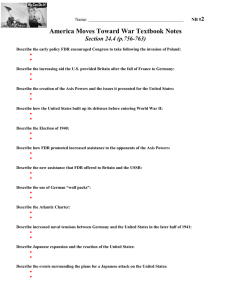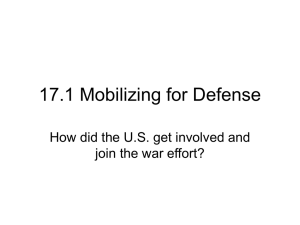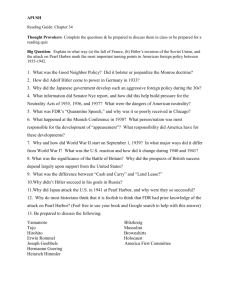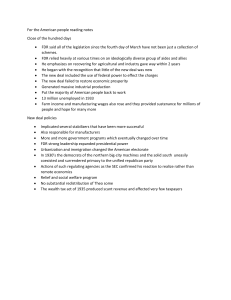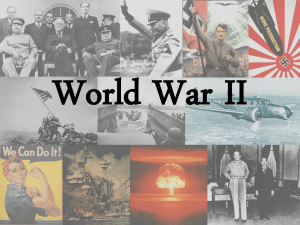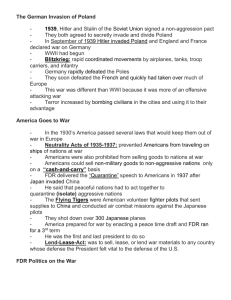Additional PPT
advertisement
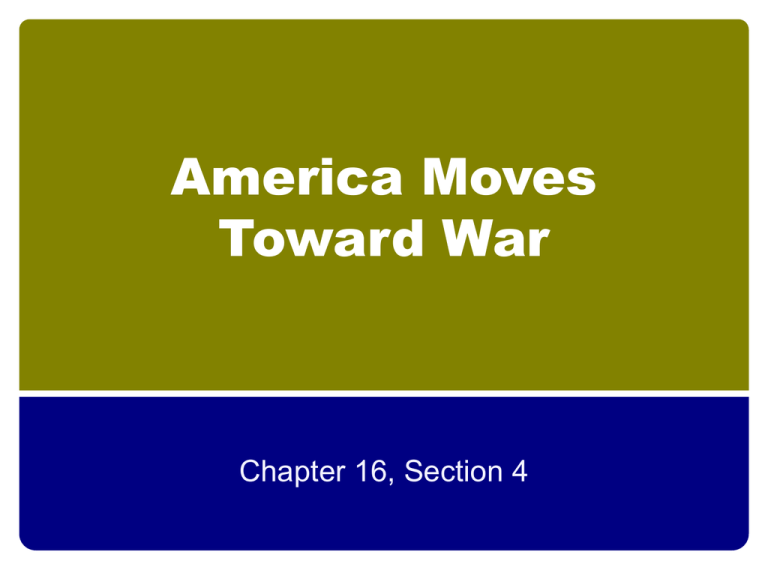
America Moves Toward War Chapter 16, Section 4 Cash-and-Carry Law Allowed U.S. to sell weapons to nations who were at war as long as those nations paid cash and transported the weapons themselves Designed to help Britain and France FDR argued this would help Britain and France defeat Germany and would keep U.S. out of the war Axis Powers Germany, Italy, and Japan signed a mutual defense treaty known as the Tripartite Pact Aimed at keeping the U.S. out of the war If U.S. joined the war, it would face a two-ocean war in the Atlantic and Pacific U.S. Increased Aid to British U.S. sent rifles and machine guns to the British U.S. traded old naval destroyers for British naval bases in the Western Hemisphere Building U.S. Defenses U.S. increased military spending Congress passed first peacetime military draft Nazi victories started to move U.S. away from isolationism Roosevelt Elected to Third Term FDR decided to run for an unprecedented third term as President FDR and his opponent both supported aid to Britain and both promised to keep the nation out of war FDR won election Election of 1940 “The Great Arsenal of Democracy” FDR told the nation that it was not possible to have peace with Hitler FDR warned that if Britain fell then Hitler would try to conquer the rest of the world FDR said that the U.S. needed to help defeat the Axis powers by being the “great arsenal of democracy” Lend-Lease Act By late 1940, Britain was out of cash FDR suggested a lend-lease plan U.S. would lend or lease weapons and supplies to any nation “whose defense was vital to the United States” Americans favored the plan, and Congress passed the Lend-Lease Act in March 1941 U.S. Neutrality Isolationist Position Interventionist Position U.S. should not tie its The events of Europe future to the eternal wars in Europe U.S. would suffer financial and military hardships The war was Europe’s problem America had its own problems affected the U.S. and the world Germany was interested in worldwide conquest America could not live peacefully in a Nazicontrolled world The U.S. had an obligation to defend democracy Germany Invaded the Soviet Union Hitler and Stalin had entered into the Nonaggression Pact in 1939 Hitler violated the agreement in June 1941 and invaded the Soviet Union Germany and the Soviet Union were at war Supporting Stalin FDR and the United States began sending lend-lease aid to the Soviet Union Some Americans opposed sending aid to a communist country Churchill: If Hitler invaded Hell, the British would be allies with the Devil German Wolf Packs Supply lines had to be kept open to Britain and to the Soviet Union Germany used U-boats (submarines) to attack U.S. supply ships Wolf packs attacked U.S. ships in coordinated attacks FDR gave U.S. Navy permission to sink German Uboats in self-defense Naval Attacks Allied ships began to use sonar to locate German submarines U.S. and Germany were essentially at war in the Atlantic by the summer of 1941 Sept. 1941: FDR gave U.S. ships the power to shoot any U-boat on sight The Atlantic Charter FDR and Churchill agree to a joint declaration of war goals called the Atlantic Charter FDR told Churchill that he couldn’t ask for a declaration of war from Congress yet But U.S. would do all it could to help wage war on Germany The Allies The Atlantic Charter became the common goals of the Allies in World War II Signed by 26 nations Nations that fought against the Axis powers Prelude to War FDR gave order for U.S. Navy to shoot German submarines on sight German U-boats continued to torpedo U.S. ships Congress allowed merchant ships to be armed U.S. and Germany on the verge of war Japan’s Ambitions in the Pacific Japan invaded China in July 1937 Japan began conquering British and French islands in the Pacific Only U.S. island territories remained as an obstacle to Japanese control of the Pacific Japanese officers after the invasion of China U.S. Cut Off Trade to Japan U.S. protested Japanese aggression by halting trade with Japan Japan could not live without oil from the U.S. Japanese leaders warned that Japan would have to convince U.S. to stop embargo or would have to capture Dutch East Indies for oil fields Peace Talks with Japan Japan and U.S. entered into peace talks But Tojo prepared for an attack on the U.S. U.S. intercepted Japanese message and learned Japan was preparing for an attack Did not know where FDR warned Pacific military commanders of an imminent strike FDR wanted Japan to strike first On the Verge Peace talks continued On Dec. 6, 1941, U.S. intercepted message telling Japanese peace negotiators to reject any American proposals U.S. knew that this likely meant war Pearl Harbor Pearl Harbor was largest U.S. naval base in the Pacific Japanese goals for the attack: Weaken U.S. navy to prevent resistance Break U.S. morale Cost U.S. time in rebuilding its navy Photo of attack, taken from a Japanese plane Attack on Pearl Harbor December 7, 1941 180 Japanese aircraft launched from six aircraft carriers attacked Pearl Harbor Attack lasted an hour and a half Attack launched in two waves U.S. antiaircraft guns barely made an impact Results: Sank 4 battleships Damaged 4 battleships Sank or damaged 3 cruisers and 3 destroyers Destroyed 188 aircraft Damaged more than 100 additional aircraft Killed 2,403 Injured 1,178 Reaction to Pearl Harbor FDR: “a date which will live in infamy” FDR knew that U.S. would have to absorb many losses in the war as it built up its military and rebuilt its navy FDR requested a declaration of war the following day President Roosevelt asks for a declaration of war on December 8, 1941 U.S. Declared War Congress approved FDR’s request for a declaration of war against Japan Three days later, Germany and Italy declared war on the U.S. U.S. faced with the prospect of a two-front war The End of Isolationism Americans united after the attack on Pearl Harbor Former isolationists supported an all-out war effort Defense spending would end the Great Depression Pearl Harbor Memorial
